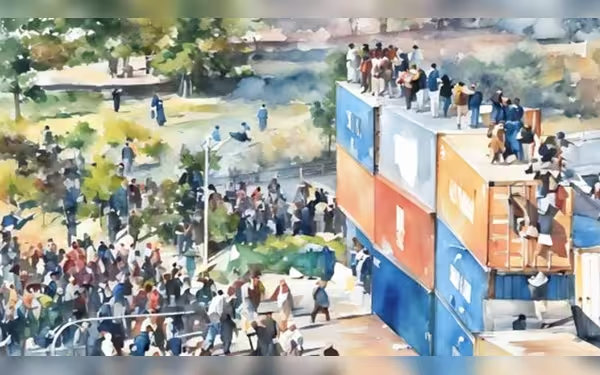Wednesday, December 4, 2024 07:04 PM
Protests Erupt in Pakistan Over Imran Khan's Incarceration
- Nationwide protests demand Imran Khan's release and election restoration.
- State employs force against demonstrators, raising concerns over civil rights.
- Political landscape marked by illegitimacy and lack of representation.
 Image Credits: thefridaytimes
Image Credits: thefridaytimesProtests in Pakistan escalate as citizens demand Imran Khan's release and address pressing political issues.
The recent protests in Pakistan have highlighted a growing discontent among the populace, particularly in the wake of the incarceration of PTI leader Imran Khan. Citizens from various regions, including Hunza, Swat, and Balochistan, have gathered in Islamabad, expressing their demands for Khan's release, the restoration of the February 2024 elections mandate, and the rescinding of the 26th constitutional amendment. This situation reflects a broader struggle against dispossession, poverty, and hopelessness that many Pakistanis face today.
As the protests unfolded, the state responded with significant force, deploying paramilitary Rangers and police to block the demonstrators. This heavy-handed approach has become a common sight in Islamabad, where citizens seeking to voice their grievances are often met with resistance. The absence of Sindh in the protest landscape raises questions about regional disparities and the collective voice of the nation.
Moreover, the financial implications of these protests cannot be overlooked. While discussions abound regarding the costs incurred by the KP government in facilitating PTI supporters, there is a pressing need for transparency regarding the expenditures of the federal and provincial governments in suppressing these protests. The resources allocated to thwart citizens exercising their right to protest could have been better utilized to address the pressing issues facing the country.
The current political landscape in Pakistan is characterized by an illegitimate parliament, which lacks the necessary representation from reserved seats. This situation has led to a parliamentary abeyance, leaving citizens in a state of uncertainty regarding their governance. The recent amendment to the constitution further complicates matters, as it restricts the avenues available for seeking justice through the judiciary.
As citizens continue to express their anguish, the question arises: what options do they have? The prevailing sentiment among the populace is one of frustration and despair, as they grapple with the realities of war, economic hardship, and social upheaval. The political discourse often seems disconnected from the struggles faced by ordinary Pakistanis, with leaders focusing on self-serving rhetoric rather than addressing the root causes of discontent.
The protests in Pakistan serve as a stark reminder of the urgent need for political accountability and genuine representation. As citizens rally for their rights, it is crucial for the leadership to listen and respond to their concerns. The path forward must involve a commitment to addressing the underlying issues that have led to this unrest, fostering a sense of unity and hope among the people. Only then can Pakistan move towards a more equitable and just society, where the voices of all citizens are heard and valued.













